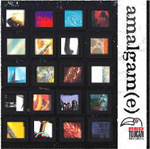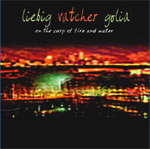| |
Red
Toucan : Then And Now
by Matthew Sumera
July 2004
The lifeblood of creative, improvised music is fostered by small,
independent labels. Anyone familiar with the music already knows this,
but it is worth a reminder now and then. And when, hope against all
hope, one of these labels manages to stay in existence for a decade,
and manages to record a wide range of compelling music from a variety
of otherwise unrecorded or under-recorded artists, it is truly worthy
of celebration.
It is with great pleasure, then, that listeners and fans of contemporary
jazz and improvised music are afforded the opportunity to rejoice
in ten years of Red Toucan through two new releases: amalgam(e),
a two-CD compilation and label retrospective, and in the cusp of
fire and water, by the trio of Stuart Liebig, Vinny Golia, and
Michael Vatcher.
THEN
 amalgam(e)
is proof enough that Red Toucan has been a vital addition and contributor
to today's jazz scene. Originally formed to document vital Québec
jazz, but later developing significant relationships with a variety
of Canadian-born and international improvisers, from clarinetist François
Houle to contrabassist Jöelle Léandre, Red Toucan has
consistently presented cutting-edge improvised music, devoid of pretension
and brimming with thoughtful, potent musicianship. amalgam(e)
is proof enough that Red Toucan has been a vital addition and contributor
to today's jazz scene. Originally formed to document vital Québec
jazz, but later developing significant relationships with a variety
of Canadian-born and international improvisers, from clarinetist François
Houle to contrabassist Jöelle Léandre, Red Toucan has
consistently presented cutting-edge improvised music, devoid of pretension
and brimming with thoughtful, potent musicianship.
Comprising twenty-two tracks and over two hours of music, amalgam(e)
is a fantastic starter course for those unfamiliar with the Red Toucan
diet. Beginning at the beginning with a humorous pre-song dialogue
among musicians that culminates in what could be a Red Toucan motto,
"check your hang-ups at the door", Charles Pappasoff's
"Serious" is both reminiscent of "Lonely Woman"
and a driving beast of a tune with the ever-resourceful Pheeroan Aklaff
in the engine room.
Tracks two through four take a sharp left turn in presenting some
of the many wonderful sessions Red Toucan has captured with the aforementioned
Houle, including recordings where the clarinetist is partnered with
label-staple Léandre, as well as Marilyn Crispell. Houle's
sound, crisp and clean, is rare in these times of multi-multi-instrumentalism,
and it is indeed a treat to hear the clarinet in the hands of a studied
master. Mostly eschewing extreme harmonics for more classically-reminiscent
tonalities, the three selections manage to showcase the range of Houle's
talents, including an almost klezmer-like swing in "Prayer",
a rough and tumble affair with Crispell, and a free-improv setting
with Léandre and Georg Graewe.
The remainder of disc one highlights a variety of group, duet, and
solo settings from increasingly well known, and hopefully soon to
be better-known players, with particularly nice statements from Dana
Reason on piano (from border crossings), Dylan van der Schyff
in fine, Bennink-link playfulness on drums playing with Paul Plimley
and others (from stable chaos), and a start-stop big band piece
alternating between Zorn-like hopping and Threadgill-like orchestration,
with trombone, cello, violin, electric guitar, tenor sax, bass, bass
clarinet, and drums (from polish theatre posters).
Disc two starts with a Peter Brötzmann blowout, acerbic as ever,
but with a bit of the ridiculous, unfortunately, in the guitar of
Sakari Luoma, who appears to be in full heavy-metal attack. The hoped-for
Last Exit sound never quite emerges, and the piece is one of the few
low points on the compilation. Tracks two and three, both featuring
Gerry Hemingway in very different settings, on the other hand, are
quite beautiful and return to the high level of disc one. Hemingway's
duet with John Butcher (from shooters and bowlers), in particular,
is beguiling as ever. A trio piece (from arrears) with Graewe,
Frank Gratkowski, and the redoubtable John Lindberg on contrabass
is again a moving piece of improvisation, with Lindberg spending the
better part of the first four minutes on the body of his bass, thumbs
and fingers, only to move to a percussive statement on the strings,
followed by some inside-the-piano finessing from Graewe: A nice, evolving
piece of collective improvisation.
Back to Léandre for tracks six and seven of disc two, this
time in performance with Masahiko Satoh—not entirely a meeting
of the minds (almost a sense of two competing aesthetics), but only
in light of the other remarkable performances from the bassist throughout
the rest of the compilation—and Yuji Takahashi—whose meeting
with the bassist turns out to be a much more satisfying endeavor.
The Laura Andel Orchestra is featured on track eight (from somnambulist)
in a four-minute take on sustain—bowed cymbals, heavy on the
strings, with some processed (?) white-noise accompaniment. A haunting
piece, truly. In with a few Chicagoans for track nine, (from wrack)
with Tim Daisy and Jeb Bishop teaming up with Kyle Bruckmann (on oboe,
English horn), Kurt Johnson (bass) and Jen Clare Paulson (viola):
Some early steam turning into a saunter and eventually evaporation,
only to restart again.
The last two tracks are highlights from the Cactus Records label,
dedicated, as the liner notes to amalagam(e) state, to "music
of a more composed nature". An interesting if less then audible distinction—certainly
the likes of polish theatre posters are heavily composed works.
Nonetheless, two pieces from Catus records are included, the first
being a welcome duet setting for Dave Liebman. The second track and
the closer to amalgam(e), is "Hommage à Debussy", performed
by Michael Jefry Stevens: A fitting tribute and lovely end to this
spectacular two disc set.
NOW
 The
newest release from Red Toucan, a trio setting for Stuart Liebig,
Vinny Golia, and Michael Vatcher, continues in the grand tradition
of the label. Vatcher in particular is an astonishing player, shamefully
under-recorded. (For those only familiar with Vatcher's playing on
Zorn's Spy Vs. Spy, Michael Moore's Jewels and Binoculars,
a set of Bob Dylan covers, is mandatory listening.) Liebig, on the
unruly E-flat ContraBassGuitar, applied tools and technology, set
up the encounter, but certainly no one here plays the starring role.
This is striking group interplay, with a generosity and musicality
too often missing in such spontaneous combinations. "flurries" turns
into a stunning clarinet workout for Golia, with wonderful moments
by all. Tracks two and three, "prelude" and "aftermath" (one wonders
what happened in between?), are extended forays into collective improvisation
with Vatcher's popguns featuring on the latter—an odd but not
gimmicky sound. The
newest release from Red Toucan, a trio setting for Stuart Liebig,
Vinny Golia, and Michael Vatcher, continues in the grand tradition
of the label. Vatcher in particular is an astonishing player, shamefully
under-recorded. (For those only familiar with Vatcher's playing on
Zorn's Spy Vs. Spy, Michael Moore's Jewels and Binoculars,
a set of Bob Dylan covers, is mandatory listening.) Liebig, on the
unruly E-flat ContraBassGuitar, applied tools and technology, set
up the encounter, but certainly no one here plays the starring role.
This is striking group interplay, with a generosity and musicality
too often missing in such spontaneous combinations. "flurries" turns
into a stunning clarinet workout for Golia, with wonderful moments
by all. Tracks two and three, "prelude" and "aftermath" (one wonders
what happened in between?), are extended forays into collective improvisation
with Vatcher's popguns featuring on the latter—an odd but not
gimmicky sound.
Golia, as always, is ultimately a melodicist—even with his typically
extreme exploration of registers and his love of, seemingly, the entire
reed family—and song-like statements never seem too far from
his mind. He puts down some aching melodies on the latter half of
"aftermath", as Vatcher seems momentarily lost to the
world. Liebig's contributions may be the hardest to pinpoint,
as his sound is rather mercurial – deeply sonorous at all tempos,
sounding both and not at all like a bass guitar. He manages some remarkable
speed, counteracted by slow-moving statements from the other two,
during the nearly eight-minute (shortest piece on the disc, by the
way) "transit". Wrapping it all up is "undertow",
beginning with the sound of falling objects courtesy of Vatcher and
a warped electronic from Liebig. The opening nine minutes are a model
of restraint until all hell brakes loose in a momentary lapse of King
Crimson (imagine Tony Levin and Bill Bruford circa Discipline
and you'll get the idea) before everyone regains their senses.
The remainder of the piece stays truer to form and ends with a swinging
outro from Golia.
A wonderful recording, worth returning to again and again; here's
to many, many more from Red Toucan.
|
|
|
|
|

